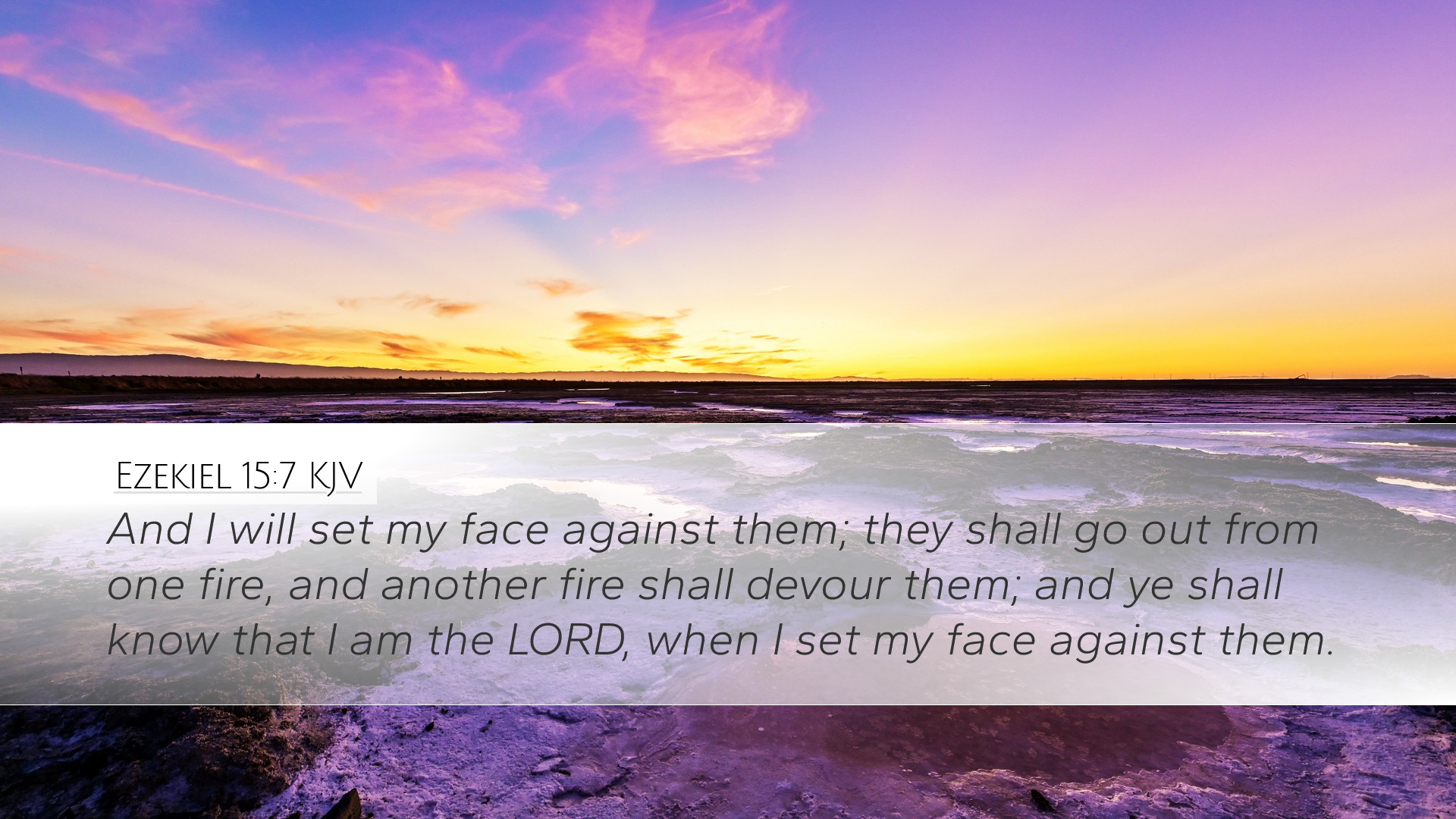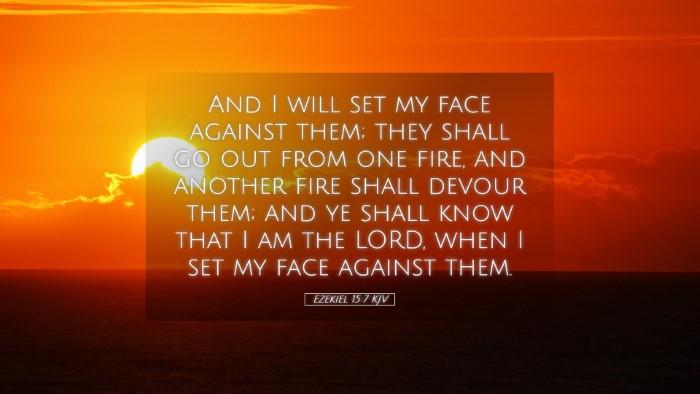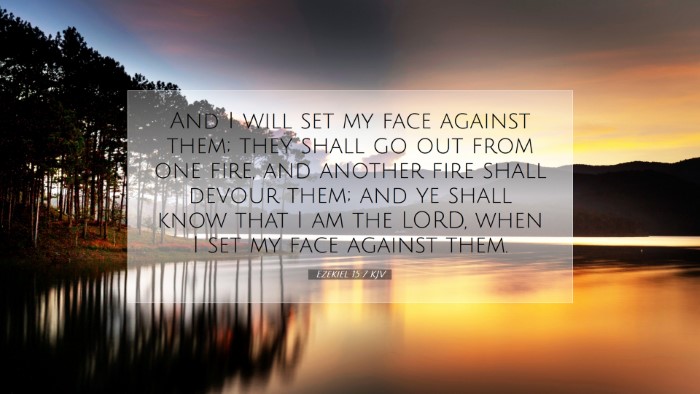Ezekiel 15:7 Commentary
Bible Verse: "And I will set my face against them; they shall go out from one fire, and another fire shall devour them; and ye shall know that I am the LORD, when I set my face against them."
Overview
This verse comes from the prophetic book of Ezekiel, where the Lord speaks through the prophet about the impending judgment upon Jerusalem and the people of Israel. The imagery of fire here represents the consuming nature of God's judgment and signifies the severe consequences of sin and rebellion against Him.
Insights from Matthew Henry
Matthew Henry notes that the context of this chapter primarily deals with God's judgment against Jerusalem, comparing His people to a vine that is not useful for anything other than burning. His commentary emphasizes the following points:
- God's Displeasure: The Lord communicates His displeasure with Israel by setting His face against them. This signifies a total withdrawal of His favor and protection.
- Symbolism of Fire: The reference to fire illustrates the destructive power of God's wrath. Being "out from one fire" indicates that one calamity may follow another, showing the relentless nature of judgment that befalls those who oppose Him.
- Recognition of Divine Sovereignty: Henry highlights the finality of God's actions when He declares that they will know He is the LORD. This acknowledgement of God's sovereignty serves a dual purpose: it is both a warning to the unrepentant and a source of hope for the faithful remnant.
Insights from Albert Barnes
Albert Barnes elaborates on the themes detailed in Ezekiel 15:7 with a focus on the fate of the unfaithful and the significance of divine judgment:
- Consequences of Apostasy: Barnes reflects that this verse embodies the broader consequences of Israel's apostasy. The people’s idolatry and unrighteousness lead to spiritual destruction, depicted here as being consumed by fire.
- Divine Retribution: In the context of divine justice, Barnes explains that God's face being set against the people signifies His active opposition to their sinfulness. The dual fires symbolize the trials that will come upon them, escalating from one calamity to another.
- A Call to Repentance: While the tone of judgment is unmistakable, Barnes suggests that the message still allows for the possibility of repentance. The recognition of God’s sovereignty serves as an invitation for Israel to turn back to Him.
Insights from Adam Clarke
Adam Clarke provides a detailed interpretation of the figurative language used in Ezekiel 15:7, emphasizing the harsh realities faced by a faithless people:
- Imagery of the Vine: Clarke draws attention to the earlier metaphor of Israel as a vine, underscoring its barren state. His analysis indicates that vines lacking fruitfulness are deserving of destruction.
- Fire as Judgment: The description of going out from one fire to another illustrates the overwhelming nature of divine judgment and the futility of escaping it. Clarke points out that the contrast emphasizes that earthly struggles will pale in comparison to the divine fire of judgment.
- Understanding God’s Nature: Clarke concludes with the central notion that the people will ultimately recognize God's righteous judgment. This recognition builds a fear of the Lord that is crucial for spiritual awakening.
Theological Implications
The implications of Ezekiel 15:7 resonate across several theological domains:
- God's Holiness: This verse reminds us of God’s holiness and the serious nature of His judgment. It reinforces that God’s judgment is not arbitrary but is aligned with His righteousness.
- Human Sinfulness: The passage serves as a sobering reminder of human depravity and the need for repentance from sin. The imagery warns believers of the destructive paths that arise from turning away from God.
- Hope in Despair: Even amidst judgment, there remains a thread of hope for those who turn back to God. The acknowledgment of God as LORD suggests His readiness to forgive and restore those who seek Him genuinely.
Application for Today
This verse encourages modern readers to reflect seriously on their relationship with God. Here are some practical applications:
- Self-Examination: Followers of Christ are called to examine their lives for signs of spiritual fruitfulness. In what areas may they resemble the vine that has become useless?
- Recognizing God’s Sovereignty: Acknowledging that God’s judgment is just, believers should live in a way that honors His sovereignty and reflect on the consequences of rebellion against Him.
- Embracing Repentance: The door to repentance and restoration remains open. Believers are exhorted to return to God, seeking His face and favor amidst a culture that often rejects His truths.
Conclusion
Ezekiel 15:7 is a stark reminder of God’s holiness, the consequences of sin, and the importance of acknowledging His sovereignty. As believers meditate on this scripture, they are encouraged to maintain a posture of humility and repentance, recognizing that God's judgment is both a warning and an invitation to authentic relationship with the Divine.


